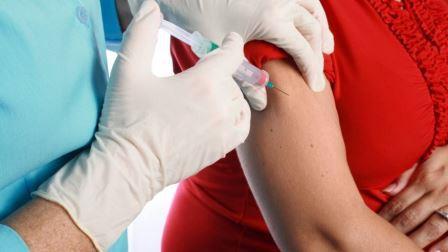
Infants are much less likely to get whooping cough if their mothers are vaccinated against the potentially fatal respiratory infection during pregnancy, a large U.S. study finds.
The bacteria Bordetella pertussis causes whooping cough, which gets its nickname from the sounds patients make as they gasp for air during intense coughing fits. Pertussis is highly contagious and easily spread when an infected individual coughs or sneezes. About half of babies under age one who catch pertussis require hospitalization for serious complications like pneumonia or brain disorders.
For the study, researchers examined data on almost 149,000 infants born in California from 2010 to 2015. They found babies whose mothers got the Tdap booster vaccine for tetnanus, diphtheria and pertussis were 91 percent less likely to get whooping cough during the first two months of life, a critical period before U.S. infants typically get their first dose of the pertussis vaccine.
“It’s very important for pregnant women to get vaccinated,” said lead study author Dr. Nicola Klein of the Kaiser Permanente Vaccine Center in Oakland, California.
“It’s an extremely effective vaccine to protect babies before they are able to get vaccinated on their own,” Klein said in a phone interview.
Health officials in many countries recommend vaccination during pregnancy, as well as a series of three shots for infants starting sometime between 6 weeks and 3 months of age. Some countries also recommend that women get vaccinated during each pregnancy because effectiveness of the shot wanes over time.
Kaiser Permanente, where all the babies in the study were born, started encouraging Tdap vaccinations for pregnant women in 2010 after a whooping cough outbreak in California. In early 2013, the U.S. Centers for Disease Control and Prevention recommended that all pregnant women get the Tdap shot, regardless of whether they previously had received this vaccine.
From 2006 to 2008, before these recommendations came out, less than 1 percent of babies at Kaiser hospitals had mothers who got vaccinated during pregnancy, the study found.
At the start of the study in 2010, about 12 percent of babies had vaccinated mothers. By 2015, 87 percent of infants had vaccinated mothers.
Babies whose mothers got the vaccine during pregnancy had a 69 percent lower risk of whooping cough in their first year of life, even after accounting for the effects of whooping cough vaccines the infants got starting at two months of age, researchers report in Pediatrics.
The study wasn’t a controlled experiment designed to prove that the vaccinating pregnant mothers protects babies from whooping cough, the authors note. Because most women who did get shots during pregnancy received them around the same time, the study also can’t help determine the optimal point in pregnancy to vaccinate mothers.
Still, this is the first study to provide very strong evidence that vaccinating pregnant women protects their babies, especially during that critical first two months of life when infants haven’t received their own dose of the vaccine, said Dr. Yvonne Maldonado, a pediatric infectious disease researcher at Stanford University School of Medicine in California, who wasn’t involved in the study.
In addition, the findings should ease concerns that vaccinating women during pregnancy might make the infants’ vaccinations at two, four and six months less effective, Maldonado said by email.
“This study demonstrated that this was not the case, and in fact there appears to be a benefit from maternal Tdap even after infant immunization,” Maldonado said.
Not all women are getting this vaccine during pregnancy, and if their doctor doesn’t offer it they should ask, said Julie Leask, a public health researcher at the University of Sydney in Australia who wasn’t involved in the study.
“The data further strengthen the case for pregnancy vaccination as the `first dose’ of vaccination in babies,” Leask said by email.
Source: Reuters
http://www.reuters.com/article/us-health-pregnancy-vaccine-idUSKBN1751Z8
 FR
FR EN
EN AR
AR








